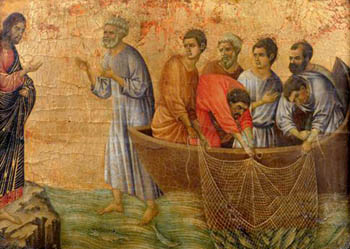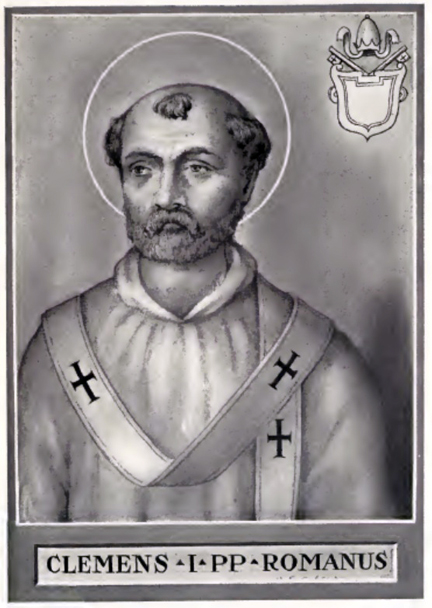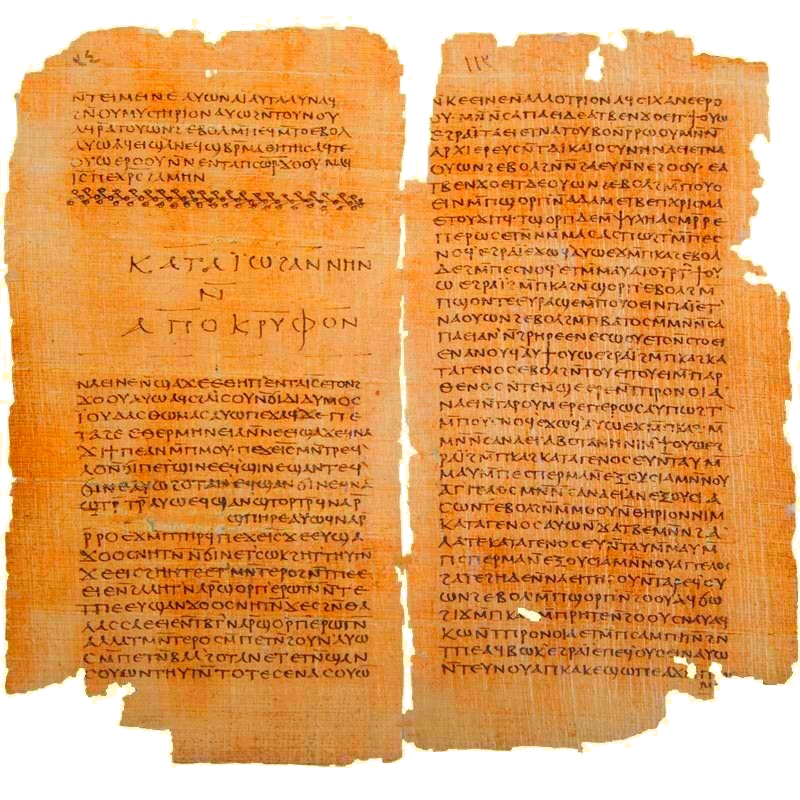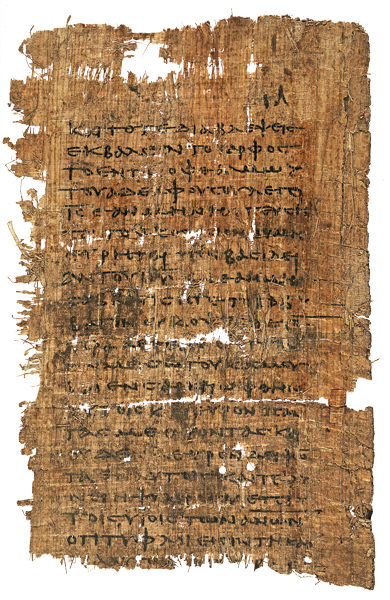|
Greek Gospel Of The Egyptians
The Greek ''Gospel of the Egyptians'' is an early Christian religious text. Its title is adopted from its opening line. Dating The Greek Gospel of the Egyptians (which is quite distinct from the later, wholly Gnostic Coptic Gospel of the Egyptians), perhaps written in the second quarter of the 2nd century, was already cited in Clement of Alexandria's miscellany, the ''Stromata'', where quotations give us many of the brief excerpts that are all that remain; it was also mentioned by Hippolytus, who alludes to "these various changes of the soul, set forth in the Gospel entitled according to the Egyptians" and connects the ''Gospel of the Egyptians'' with the Gnostic Naassene sect. Later, that 4th-century collector of heresies, Epiphanius of Salamis, asserts that the Sabellians made use of this gospel; though it is unlikely that he had any firsthand information about Sabellius, who taught in the early 3rd century. The euphemism, the Word ''logos'', as an appellation of the Saviou ... [...More Info...] [...Related Items...] OR: [Wikipedia] [Google] [Baidu] |
Clement Of Alexandria
Titus Flavius Clemens, also known as Clement of Alexandria ( grc , Κλήμης ὁ Ἀλεξανδρεύς; – ), was a Christian theologian and philosopher who taught at the Catechetical School of Alexandria. Among his pupils were Origen and Alexander of Jerusalem. A convert to Christianity, he was an educated man who was familiar with classical Greek philosophy and literature. As his three major works demonstrate, Clement was influenced by Hellenistic philosophy to a greater extent than any other Christian thinker of his time, and in particular, by Plato and the Stoics. His secret works, which exist only in fragments, suggest that he was familiar with pre-Christian Jewish esotericism and Gnosticism as well. In one of his works he argued that Greek philosophy had its origin among non-Greeks, claiming that both Plato and Pythagoras were taught by Egyptian scholars. Clement is usually regarded as a Church Father. He is venerated as a saint in Coptic Christianity, Ea ... [...More Info...] [...Related Items...] OR: [Wikipedia] [Google] [Baidu] |
Androgynous
Androgyny is the possession of both masculine and feminine characteristics. Androgyny may be expressed with regard to biological sex, gender identity, or gender expression. When ''androgyny'' refers to mixed biological sex characteristics in humans, it often refers to intersex people, who are born with congenital variations that complicate assigning their sex at birth. In comparison, hermaphroditism is the possession of both male and female reproductive organs. Regarding gender identity, androgynous individuals may identify with non-binary identities. Others may identify as transgender. As a form of gender expression, androgyny has fluctuated in popularity in different cultures and throughout history. Physically, an androgynous appearance may be achieved through personal grooming, fashion, or hormone treatment. Etymology The term derives from grc, ἀνδρόγυνος, from , stem - (''anér, andro-'', meaning man) and (''gunē, gyné'', meaning woman) through the l ... [...More Info...] [...Related Items...] OR: [Wikipedia] [Google] [Baidu] |
Pistis Sophia
''Pistis Sophia'' ( grc-koi, Πίστις Σοφία) is a Gnostic text discovered in 1773, possibly written between the 3rd and 4th centuries AD. The existing manuscript, which some scholars place in the late 4th century, relates one Gnostic group's teachings of the transfigured Jesus to the assembled disciples, including his mother Mary, Mary Magdalene, and Martha. (In this context, "transfigured" refers to Jesus after his death and resurrection, not the event during his life where he spoke to appearances of Moses and Elijah on a mountain.) In this text, the risen Jesus had spent eleven years speaking with his disciples, teaching them only the lower mysteries. After eleven years, he receives his true garment and is able to reveal the higher mysteries revered by this group. The prized mysteries relate to complex cosmologies and knowledge necessary for the soul to reach the highest divine realms. Much of the first two books of the manuscript are dedicated to outlining the my ... [...More Info...] [...Related Items...] OR: [Wikipedia] [Google] [Baidu] |
Second Epistle Of Clement
The Second Epistle of Clement ( grc, Κλήμεντος πρὸς Κορινθίους, Klēmentos pros Korinthious, from Clement to Corinthians), often referred to as 2 Clement (pronounced "Second Clement"), is an early Christian writing. It was at one point possibly considered canonical by the Coptic Orthodox Church. Authorship 2 Clement was traditionally believed to have been an epistle to the Christian Church in Corinth written by Clement of Rome sometime in the late 1st century. However, 4th-century bishop Eusebius, in his historical work, says that there was ''one'' recognized epistle of Clement (namely the so-called First Epistle of Clement). He expresses doubt about the authenticity of a second epistle (see below). Similar doubts were also expressed by Jerome in the 5th century. Modern scholars believe that Second Clement is actually a sermon written around 95–140 CE by an anonymous author, one who was not Clement of Rome. Nonetheless, scholars still generally refer to ... [...More Info...] [...Related Items...] OR: [Wikipedia] [Google] [Baidu] |
Marvin Myer
Marvin may refer to: __NOTOC__ Geography ;In the United States * Marvyn, Alabama, also spelled Marvin, an unincorporated community * Marvin, Missouri, an unincorporated community * Marvin, North Carolina, a village * Marvin, South Dakota, a town * Robley, Virginia, also known as Marvin * Lake Marvin, a lake in Georgia ;Elsewhere * Marvin Islands, Nunavut, Canada People and fictional characters * Marvin (given name), including a list of people and fictional characters * Marvin (surname), including a list of people and fictional characters Arts and entertainment * ''Marvin the Album'', an album by the Australian group Frente! * "Marvin (Patches)", a song by Titãs * "Marvin" (Marvin the Paranoid Android song), a song by Marvin the Paranoid Android (1981) * ''Marvin'' (film), a 2017 French film * ''Marvin'' (comic), a newspaper comic strip Other uses * Marvin (robot), developed by the University of Kaiserslautern Robotics Research Lab in Germany See also * Marven Gardens, a h ... [...More Info...] [...Related Items...] OR: [Wikipedia] [Google] [Baidu] |
Elaine Pagels
Elaine Pagels, née Hiesey (born February 13, 1943), is an American historian of religion. She is the Harrington Spear Paine Professor of Religion at Princeton University. Pagels has conducted extensive research into early Christianity and Gnosticism. Her best-selling book ''The Gnostic Gospels'' (1979) examines the divisions in the early Christian church, and the way that women have been viewed throughout Jewish history and Christian history. Modern Library named it as one of the 100 best books of the twentieth century. Early life and education Pagels (pronounced Paygulls) was born February 13, 1943, in California. She is the daughter of Stanford University botanist William Hiesey. According to Pagels, she has been fascinated with the Gospel of John since her youth. She found it to be "the most spiritual of the four gospels". After joining an Evangelical church at the age of 13, she quit when the church announced that a Jewish friend of hers who had been killed in a car crash ... [...More Info...] [...Related Items...] OR: [Wikipedia] [Google] [Baidu] |
Gospel Of Thomas
The Gospel of Thomas (also known as the Coptic Gospel of Thomas) is an extra-canonical sayings gospel. It was discovered near Nag Hammadi, Egypt, in December 1945 among a group of books known as the Nag Hammadi library. Scholars speculate that the works were buried in response to a letter from Bishop Athanasius declaring a strict canon of Christian scripture. Scholars have proposed dates of composition as early as 60 AD and as late as 250 AD. Since its discovery, many scholars have seen it as evidence in support of the existence of a " Q source" which might have been very similar in its form as a collection of sayings of Jesus without any accounts of his deeds or his life and death, referred to as a sayings gospel. The Coptic language text, the second of seven contained in what modern-day scholars have designated as Nag Hammadi Codex II, is composed of 114 sayings attributed to Jesus. Almost two-thirds of these sayings resemble those found in the canonical gospels and its ... [...More Info...] [...Related Items...] OR: [Wikipedia] [Google] [Baidu] |
Celibacy
Celibacy (from Latin ''caelibatus'') is the state of voluntarily being unmarried, sexually abstinent, or both, usually for religious reasons. It is often in association with the role of a religious official or devotee. In its narrow sense, the term ''celibacy'' is applied only to those for whom the unmarried state is the result of a sacred vow, act of renunciation, or religious conviction. In a wider sense, it is commonly understood to only mean abstinence from sexual activity. Celibacy has existed in one form or another throughout history, in virtually all the major religions of the world, and views on it have varied. Classical Hindu culture encouraged asceticism and celibacy in the later stages of life, after one has met one's societal obligations. Jainism, on the other hand, preached complete celibacy even for young monks and considered celibacy to be an essential behavior to attain moksha. Buddhism is similar to Jainism in this respect. There were, however, significan ... [...More Info...] [...Related Items...] OR: [Wikipedia] [Google] [Baidu] |
Encratites
The Encratites ("self-controlled") were an ascetic 2nd-century sect of Christians who forbade marriage and counselled abstinence from meat. Eusebius says that Tatian was the author of this heresy. It has been supposed that it was these Gnostic Encratites who were chastised in the epistle of 1 Timothy (4:1-4). Early history The first mention of a Christian sect of this name occurs in Irenæus. They are mentioned more than once by Clement of Alexandria, who says that they are named from "Temperance". Hippolytus of Rome refers to them as "acknowledging what concerns God and Christ in like manner with the Church; in respect, however, of their mode of life, passing their days inflated with pride"; "abstaining from animal food, being water-drinkers and forbidding to marry"; "estimated Cynics rather than Christians". On the strength of this passage it is supposed that some Encratites were perfectly orthodox in doctrine, and erred only in practice. Origen says they did not acknowledge S ... [...More Info...] [...Related Items...] OR: [Wikipedia] [Google] [Baidu] |
Gnosticism
Gnosticism (from grc, γνωστικός, gnōstikós, , 'having knowledge') is a collection of religious ideas and systems which coalesced in the late 1st century AD among Jewish and early Christian sects. These various groups emphasized personal spiritual knowledge ('' gnosis'') above the orthodox teachings, traditions, and authority of religious institutions. Gnostic cosmogony generally presents a distinction between a supreme, hidden God and a malevolent lesser divinity (sometimes associated with the Yahweh of the Old Testament) who is responsible for creating the material universe. Consequently, Gnostics considered material existence flawed or evil, and held the principal element of salvation to be direct knowledge of the hidden divinity, attained via mystical or esoteric insight. Many Gnostic texts deal not in concepts of sin and repentance, but with illusion and enlightenment. Gnostic writings flourished among certain Christian groups in the Mediterranean wor ... [...More Info...] [...Related Items...] OR: [Wikipedia] [Google] [Baidu] |
Theodotus Of Byzantium
Theodotus of Byzantium ( grc, Θεόδoτoς ''Theodotos''; also known as Theodotus the Tanner, Theodotus the Shoemaker, Theodotus the Cobbler, and Theodotus the Fuller; flourished late 2nd century) was an Adoptionist theologian from Byzantium, one of several named Theodotus whose writings were condemned as heresy in the early church. Theodotus held the profession of a leatherworker or fuller in Byzantium. He taught that Jesus was a non-divine man, and though later "adopted" by God upon baptism (that is to say, he became the Christ), was not himself God until after his resurrection. This doctrine, sometimes called "Dynamic Monarchianism" or " Adoptionism", was declared heretical by Pope Victor I, and Theodotus was excommunicated. See also * Artemon * Paul of Samosata Paul of Samosata ( grc-gre, Παῦλος ὁ Σαμοσατεύς, lived from 200 to 275 AD) was Bishop of Antioch from 260 to 268 and the originator of the Paulianist heresy named after him. He was a bel ... [...More Info...] [...Related Items...] OR: [Wikipedia] [Google] [Baidu] |
Apocrypha
Apocrypha are works, usually written, of unknown authorship or of doubtful origin. The word ''apocryphal'' (ἀπόκρυφος) was first applied to writings which were kept secret because they were the vehicles of esoteric knowledge considered too profound or too sacred to be disclosed to anyone other than the initiated. ''Apocrypha'' was later applied to writings that were hidden not because of their divinity but because of their questionable value to the church. In general use, the word ''apocrypha'' has come to mean "false, spurious, bad, or heretical". Biblical apocrypha are a set of texts included in the Septuagint and the Latin Vulgate, but not in the Hebrew Bible. While Catholic tradition considers some of these texts to be deuterocanonical, and the Orthodox Churches consider them all to be canonical, Protestants consider them apocryphal, that is, non-canonical books that are useful for instruction. Luther's Bible placed them in a separate section in between the Old Tes ... [...More Info...] [...Related Items...] OR: [Wikipedia] [Google] [Baidu] |
_-_Foto_G._Dall'Orto.jpg)







